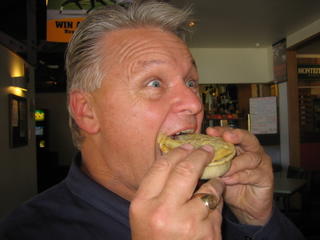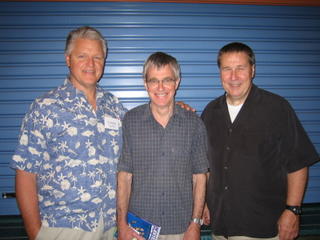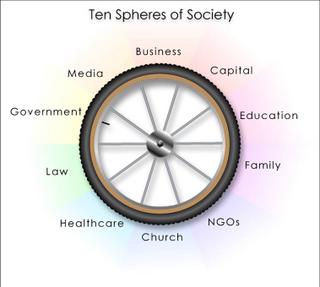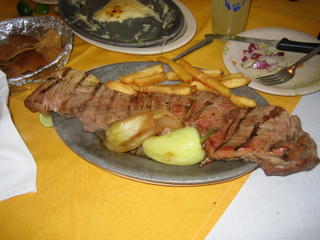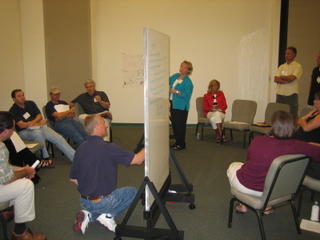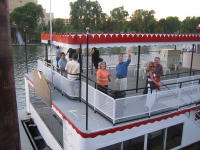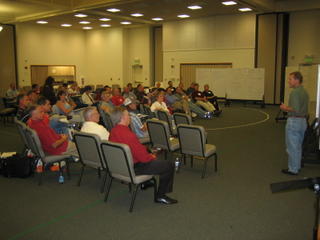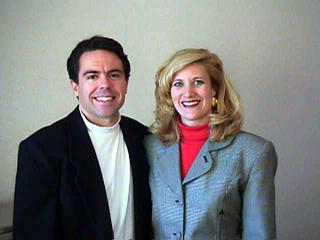From
Sources of Power by Gary Klein
[On the Coke – Pepsi Challenge…the reason Coke created new Coke since in blind taste tests people preferred the taste of Pepsi] “No one drinks Coke blind. We transfer sensations of the Coke taste, all of the unconscious associations. We have of the brand, the image, the can and even the unmistakable red of the logo. The mistake Coke made was in attributing their loss in share to Pepsi entirely to the product…Pepsi was focusing on youth and made Michael Jackson the spokesman.” [There is also the bias of taste test sips since people on the first sip prefer the sweeter taste] p. 166
“Every human change begins with someone having an intention, taking an initiative. This could range from planning a military invasion to setting up a university, inventing electricity to electrifying a political campaign, creating a new government to investing in a new business venture. At the heart of the matter lies the question of who initiates a change, in what circumstances, for what reason, proceeding by what means toward what outcome.” Transforming Leadership, James MacGregor Burns, p. 17
“No single discipline—philosophy, psychology, history, political science—anyone can deal adequately with the phenomenon of causation because the subject lies outside as well as inside every discipline. A multidiscipline is necessary to borrow from and synthesize existing intellectual resources, and to generate new ones in the process, a discipline that can approach causation using the widest array of conceptual and empirical tools. That discipline is leadership—the X factor in historic causation.” Transforming Leadership, James MacGregor Burns, p. 22
Change and Transformation
“We must distinguish here between the verbs “change” and “transform,” using exacting definitions. To change is to substitute one thing for another, to give and take, to exchange places, to pass from one place to another. These are the kinds of changes I attribute to transactional leadership. But to transform something cuts much more profoundly. It is to cause a metamorphosis in form or structure, a change in the very condition or nature of a thing, a change into another substance, a radical change in outward form or inner character, as when a frog is transformed into a prince or a carriage maker into an auto factory. It is change of this breadth and depth that is fostered in transforming leadership.” Transforming Leadership, James MacGregor Burns, P. 24
“Leaders take the initiative in mobilizing people for participation in the processes of change, encouraging a sense of collective identity and collective efficacy, which in turn brings stronger feelings of self-worth and self-efficacy, described by Bernard Bass as an enhanced ‘sense of meaningfulness in their work and lives.’ Bu pursuing transformational change, people can transform themselves.” [emphasis Eric’s] Transforming Leadership, James MacGregor Burns, P. 27
“Virtue refers to the ‘old-fashioned’ norms of conduct—habits of action—such as chastity, sobriety, cleanliness, honesty in personal relationships, self-control…Ethics reflect modes of more formal and transactional conduct—integrity, promise keeping, trustworthiness, reciprocity, accountability—supremely expressed in the golden rule…Bill Clinton was roundly criticized for his unvirtuous conduct with a young White house intern. Still, he was found more gravely at fault—and was impeached—for lying about it. In this case the American public seemed to understand the difference between virtue and ethics.” Transforming Leadership, James MacGregor Burns, P. 28
Battle planning can be defined as constant groping for an understanding of the situation. In civilian life, too, this will be the first question a fire chief asks of his men, or a surgeon of a nurse. The next question is predictable too: what can be done to maintain or change the situation? Generals must be analysts of causation.” Transforming Leadership, James MacGregor Burns, P. 57
"We want something new and innovative that has stood the test of time." John Handy quoting management in any organization
“Old things are passing away. All things may become new. Not by magic, nor by wishful thinking, but by self-sacrifice and the will to bring them about in the name of Jesus Christ.” John R. Mott
Religious truth was not intended merely to be contemplated; it was designed to be done. Our moral and religious life is not a train of thoughts but a life of action, of constant exertion of the will.” John R. Mott
John Mott Application Questions:
What does this mean to me?
What should this mean to others through me?
"Being deeply loved by someone gives you strength; loving someone deeply gives you courage."
Lao Tzu“On earth, we are wayfarers, always on the go. This means that we have to keep on moving forward. Therefore, be always unhappy about where you are if you want to reach what you are not. If you are pleased with what you are, you have stopped already. If you say; ‘It is enough,’ you are lost. Keep on walking, moving forward, trying for the goal. Don’t try to stop on the way, or to go back, or to deviate from it.”
-- St. Augustine: (Sermon, 169.18)
“There are burning bushes where you can see God but most people just pick the blackberries.”—Don Simmons
“I had the experience but missed the meaning.” Attributed to both TS Elliott and CS Lewis
"Know your stuff; Know who you are stuffing; Stuff it!" Advise to Don Simmons from professor.
"Candor...is a willingness to speak the unspeakable, to expose unfulfilled commitements, to air the conflicts that undermine apparent consensus. Candor means that people express their real opinions." Ram Charan, "Conquering a Culture of Indecision," Harvard Business Review, April, 2001
"This city is a cooking pot, and we are the meat." Ezekiel 11:3
"When I pick up a book, I expect the introduction to tell me what question the author intends to answer. Then I look at what is emphasized--usually in boldface or italics--to see whether the author stays focused on that question. I also appreciate it when the author explains how the book is organized, because that affects how easy it is to assimilate the information." Robert Morris,
Been There, Read That, HBR October 2005, p. 22
On Missions"Mission is less about the transportation of God from one place to another and more about the identification ofa aGod who is already there. It is almost as if being a good missionary means having really good eyesight. You see God where others don't. And then you point him out.--Rob Bell, in
Life and Leadership, Volume 5, Issue 7
On Impact"The life I touch for good or ill will touch another life, and that in turn another, until who knows where the trembling stops or in what far place my touch will be felt?"--Frederick Buechner in
Life and Leadership, Volume 5, Issue 7
On Risk"Twenty years from now you will be more disappointed by the things that you didn't do than by the ones you did do. So throw off the bowlines. Sail away from the safe harbor. Catch the trade winds in your sails. Explore. Dream. Discover."--Mark Twain in
Life and Leadership, Volume 5, Issue 7
On Simplicity"When the solution is simple, God is answering."--Albert Einstein in
Life and Leadership,Volume 5, Issue 7
On Creativity"When my daughter was about seven years old, she asked me what I did at work. I told her that I worked at the college--that my job was to teach people to draw. She stared back at me, incredulous, and said, 'You mean they forgot?'"--Howard Ikemoto in
Life and Leadership, Volume 5, Issue 7
 The praying hands were originally fashioned on the top of a mountain in Hong Kong where they proportedly performed their first miracle...the quelling of a violent argument between two Chinese men. Pleading with the men did nothing to calm the anger but when the praying hands were held out the men's rancor subsided and a peace settled over them. They reconciled and soon prosperity came to their village. With such bonified and attested power, the hands were smuggled into the states where they found their way to a Mexican Restaurant in Lafayette Colorado where they were enshrined. Soon their divine attributes became well known as everyone who came to the restaurant came hungry but miraculously left feeling completely bloated. Everyone wanted to be blessed by the praying hands!
The praying hands were originally fashioned on the top of a mountain in Hong Kong where they proportedly performed their first miracle...the quelling of a violent argument between two Chinese men. Pleading with the men did nothing to calm the anger but when the praying hands were held out the men's rancor subsided and a peace settled over them. They reconciled and soon prosperity came to their village. With such bonified and attested power, the hands were smuggled into the states where they found their way to a Mexican Restaurant in Lafayette Colorado where they were enshrined. Soon their divine attributes became well known as everyone who came to the restaurant came hungry but miraculously left feeling completely bloated. Everyone wanted to be blessed by the praying hands!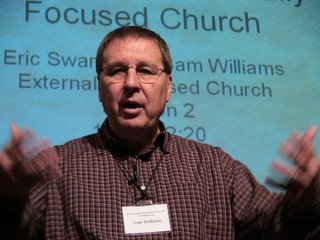


 This morning I took a walk around beautiful Christchurch along a river that meanders through the city. Just a beautiful walk that took me into the heart of Christchurch. We caught a 10:30am flight from Christchurch to Wellington…the capital city of New Zealand. We stopped in for fish and chips (NZ has the very best fish and chips) on the way to The Street City Church (
This morning I took a walk around beautiful Christchurch along a river that meanders through the city. Just a beautiful walk that took me into the heart of Christchurch. We caught a 10:30am flight from Christchurch to Wellington…the capital city of New Zealand. We stopped in for fish and chips (NZ has the very best fish and chips) on the way to The Street City Church (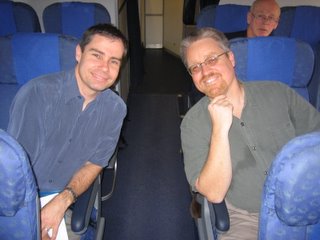 Sam Williams and I are in New Zealand. The great thing about flying to New Zealand is lifting off at 11:30pm in Los Angeles and arriving in Auckland twelve hours later at 8 in the morning…two days later. After clearing customs, Andrew Cox and Howard Webb (photo above) welcomed us with big smiles on their faces. Andrew and Howard work as part of Campus Crusade’s “Love Your Neighbor” campaign (
Sam Williams and I are in New Zealand. The great thing about flying to New Zealand is lifting off at 11:30pm in Los Angeles and arriving in Auckland twelve hours later at 8 in the morning…two days later. After clearing customs, Andrew Cox and Howard Webb (photo above) welcomed us with big smiles on their faces. Andrew and Howard work as part of Campus Crusade’s “Love Your Neighbor” campaign (